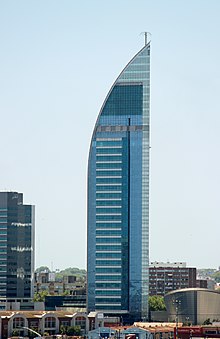The history of Uruguay comprises different periods: the pre-Columbian time or early history, the Colonial Period (1516–1811), the Period of Nation-Building (1811–1830), and the history of Uruguay as an independent country (1830–present).

The economy of Uruguay features an export-oriented agricultural sector and a well-educated workforce, along with high levels of social spending. Tourism and banking are also prominent sectors; Uruguay acts as a regional hub for international finance and tourism. The country also has a history and representation of advanced workers-rights protection, with unions and the eight-hour work-day protected at the beginning of the 20th century.
Telecommunications in Uruguay includes radio, television, telephones, and the Internet.

The National Party also known as the White Party, is a major political party in Uruguay. Founded in 1836 by General Manuel Oribe, it is the country's oldest active political party, and along with the Colorado Party, its origin dates back to the establishment of Uruguay as an independent state.

Telecom Argentina S.A. is the major local telephone company for the northern part of Argentina, including the whole of the city of Buenos Aires. Briefly known as Sociedad Licenciataria Norte S.A., it quickly changed its name, and is usually known as simply "Telecom" within Argentina.

Luis Alberto Aparicio Alejandro Lacalle Pou, is a Uruguayan politician and lawyer, serving as the 42nd president of Uruguay since 2020.
The Internet in Chile has its roots in experimental tests conducted in 1986 between the Universidad de Chile and the Universidad de Santiago de Chile, the two main public universities in the country. Its commercialization began in the mid-1990s, and it experienced widespread adoption in the second half of the 2000s. Before this, Chile had previously attempted the Cybersyn project in 1971, which aimed to establish an almost real-time economic information transfer system with the government, but it did not succeed.

Gabriel Gurméndez Armand-Ugon is a Uruguayan industrial engineer, business executive and politician of the Colorado Party (PC), who served as president of the National Administration of Telecommunications from 2020 to 2023, and as Minister of Transport and Public Works in 2004.

Ana Carolina Cosse Garrido is a Uruguayan engineer and politician who has been Intendant of Montevideo since November 27, 2020. A member of the Broad Front, she served as Minister of Industry, Energy, and Mining from 2015 to 2019 during the second administration of President Tabaré Vázquez. In the 2019 Uruguayan general election, she was elected to the Senate of Uruguay, taking her seat on February 15, 2020. On September 27, 2020, she was elected Intendant of Montevideo, the capital of the country. She is a candidate in the 2024 Broad Front presidential primaries for president of Uruguay in the 2024 general election.

Agustín Daniel Casanova Sommaruga is an Uruguayan singer, songwriter and actor. He rose to prominence as the vocalist of the cumbia-pop band Márama, which achieved international success and toured several Latin American countries and Spain.

The Antel Arena is a multipurpose indoor arena that is located in the neighborhood of Villa Española, Montevideo, Uruguay. The arena has a capacity of 15,000 people for concerts, and 10,000 people for basketball games.
The COVID-19 pandemic in Uruguay has resulted in 1,037,893 confirmed cases of COVID-19 and 7,625 deaths.
Got Talent Uruguay is a Uruguayan reality television series, and part of the global Got Talent franchise created by Simon Cowell. Presented by Natalia Oreiro, it is produced by Fremantle along Syco Entertainment, and broadcast on Channel 10. The show debuted on June 22, 2020, being, its first episode, the most watched program of the day, reaching 17.7 rating points. It airs every Monday at 9 p.m.
The National Ballet of Uruguay is a Uruguayan ballet company that was founded in 1935 in Montevideo. It is the public body in charge of developing the professional classical ballet in Uruguay, it is under the administration of the Official Service of Broadcasting, Television and Entertainment (SODRE).

Nuevocentro Shopping is a shopping mall of Montevideo, Uruguay. It is located in the neighborhood Jacinto Vera.
The first season of Got Talent Uruguay, an Uruguayan talent show competition, was broadcast in Uruguay during 2020, from June 22 to December 7 on Channel 10. The judging panel was formed by Orlando Petinatti, María Noel Riccetto, Claudia Fernández and Agustín Casanova. Alongside the main programme, the first series was accompanied by a spin-off sister programme on the same station, titled Amamos el Talento, hosted by Noelia Etcheverry and Kairo Herrera.

Julio Daniel Salinas Grecco is a Uruguayan neurologist and politician of Open Cabildo (CA), who served as Minister of Public Health of Uruguay from 1 March 2020 to 13 March 2023.

Omar Ignacio Paganini Herrera is an Uruguayan electrical engineer, academic and politician of the National Party, serving as Minister of Foreign Relations since November 2023 under president Luis Lacalle Pou. Previously, he served as Minister of Industry, Energy and Mining from March 2020 to November 2023.

Lucas Alberto Sugo Rodríguez is a Uruguayan singer, songwriter and television personality. He began his career in 2002, as a vocalist and guitarist for the band called Sonido Profesional.
Proyecto Neptuno, sometimes also called Proyecto Arazatí, is a water infrastructure development project in Arazatí, in the departament of San José in Uruguay. A consortium of businesses named "Aguas de Montevideo" presented the project in 2020 to create a water treatment plant that draws water from the Río de la Plata near Azaratí, to satisfy the water needs of the Montevideo Metropolitan area.













